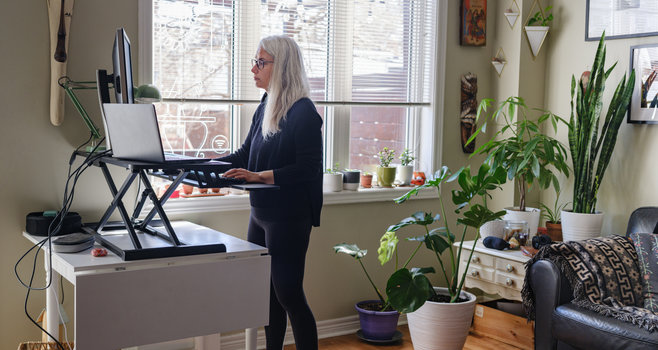As the business world shifts due to the pandemic, there’s an evolution happening around how we work. Work from wherever is shaking up the fundamentals of how employers and employees view work. So, what does this mean for the future? Will work from wherever outlive the pandemic era?
Work Life Before Coronavirus Was Office-Centric
Before the coronavirus, commercial real estate was booming. Companies were building new corporate headquarters that were state of the art with lots of tech and new layouts. Telework was an option for some but not highly adopted. A 2019 survey by the Bureau of Labor Statistics found only 7 percent of civilian workers had the choice. Telework was gaining momentum, but for the most part, the state of work was office-centric.
Then the pandemic hit, and we had massive shutdowns with quarantine and shelter-in-place rules. There was really no forewarning of this, but suddenly, just about every kind of company needed a work-from-home initiative, and they needed it fast. In this new dynamic, you had to rethink everything. How will you operate your business? Serve customers? Empower your employees? Meet compliance measures? And so on.
Many Took the Short-Term Approach
When faced with significant change, it’s natural to seek out short-term solutions. It’s easier than making big changes. So, companies told employees to forward calls to their mobile phones and use their laptops at home. Organizations that took this approach didn’t think long-term about the challenges this would bring. There were concerns about Wi-Fi, security, collaboration, access to documents, and all those elements that enable people to do their job.
At that point, we had little information about the virus and how long shutdowns would be in place. So, the motto of the day was to put a Band-Aid on it and proceed. Then the situation began to intensify. There were still restrictions in place, and companies wanted their employees to be safe. At this point business leaders started to rethink remote work and their workforce.
Rethinking How and Where We Work
We’ve been seeing this shift from customers. Businesses are rethinking work and the how and where parts of it. The approach before was short-sided, but not intentionally so.
Companies are thinking beyond forwarding calls to a mobile phone. They are thinking about working better and delivering flexibility to employees. That flexibility means bringing the entire office environment into their homes. It’s about accessibility and providing the right tools for employees to be productive and effective from anywhere. That’s the mindset change we’re experiencing because no matter what or where your business is, the ability to return to the office is still volatile. You could go back, then have an outbreak and be right back to remote only.

Work from Wherever: Long-Term Solutions
This change in perspective is prompting businesses to now seek out long-term solutions for remote work. A long-term plan means having the right technology in place to support workers. Now, everything you had access to at your desk at work should also be accessible from wherever–your phone, chat, video conferencing, email, file sharing, and any other office environment function. Ultimately, businesses that will perform well with remote work are the ones that create a virtual workspace.
When you provide this to teams, it resolves the problems of the “patchwork” remote work that was previously happening. Another aspect of this change in mindset is flexibility. Flexibility means many things in the business world. In this context, I mean flexibility to communicate, collaborate, and interact. What does it look like in the work from wherever environment? It means I can have video calls with my team, partners, or customers. It means I can share files securely when necessary. Or, that I can quickly get an answer to a question through chat.
Why Work from Wherever Isn’t Just a Trend
The virus and social restrictions accelerated this phase, but there were already early adopters of work from wherever models, some of which have been very successful. Now, there’s more urgency around transforming and still many unknowns. Different states, cities, and regions have different protocols in place. So, we’re not looking at consistency from one area to the next.
In California, where I am, we’re at the six-month mark of remote work, and we’ve gotten used to it. With everyone more comfortable with this situation and the realization that there’s been no negative impact, I’m hearing clients say we like this, and it’s going to be something permanent. Some well-known companies are agreeing that remote work is the future. Consider the case of REI, that built this beautiful new campus, and now they’re selling it and embracing a distributed work model.
The pandemic forced companies to jump off this cliff, but now they see it’s not a bad idea, and the water below was much calmer than expected. It reduces overhead and opens up the talent pool. It can also help to retain great employees that want or need to move out of your metro area.
What Defines Work from Wherever?
From my perspective, work from wherever is a mindset involving a flexible work environment with the right tools. It’s integral that to work better in this new setting, your employees are able to communicate and collaborate in an easy manner where everything’s integrated and mobile.
A remote workforce still has every capability to focus on business goals. The approach may be somewhat different from video calls rather than in-person meetings. From a management perspective, leading a remote team isn’t that different. Leadership doesn’t happen only in an office. Keeping up communication, checking in, and connecting can happen virtually. Through our Business Innovators series, I’ve also seen how our clients are using our tools to engage each other and work together. It’s been inspiring to hear their stories and how our products are playing a role in this new phase of their businesses.
What Are Your Thoughts on Work from Wherever?
Work from wherever is a mindset and a culture. It’s not just about technology or location. I’d love to hear your thoughts on work from wherever and what it means to your company.
March 7, 2022
Explore other posts on these topics:



